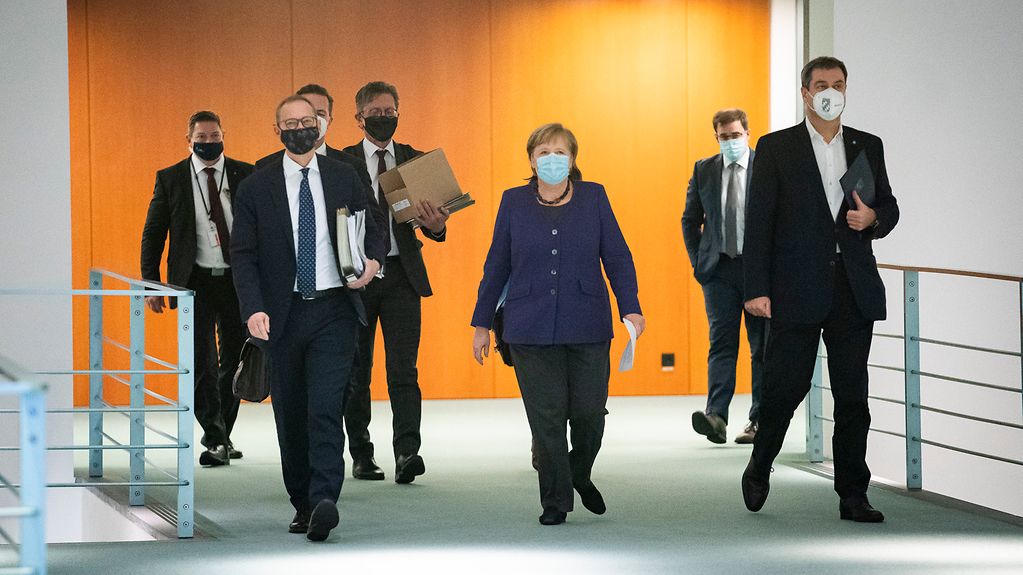Meeting with state premiers
The Chancellor and the state premiers of the federal states met on Wednesday for their regular autumn talks. In a video conference, they stressed common ground and adopted important resolutions, including their decision to extend the COVID-19 measures currently in place until 10 January. Other items on the agenda included all-day care at primary school level and steps to tackle right-wing extremism.
3 min reading time

Chancellor Angela Merkel and the state premiers of the federal states agreed to extend the partial lockdown until 10 January.
Photo: Bundesregierung/Kugler
Partial lockdown extended until 10 January 2021
Participants at the meeting agreed to extend until 10 January 2021 the measures adopted by federal and state governments in November to fight the pandemic. "We aim to get back to an incidence below 50 cases per 100,000 inhabitants. We are still a long way off that goal," said Angela Merkel at the press conference after the meeting.
"Avoid contacts wherever possible," stressed the Chancellor. The virus cannot be cheated or explained away. Although the exponential growth has been halted, the number of new cases is still high. Angela Merkel announced that the next meeting with state premiers would be held on 4 January next year. "Then we will see where we stand," said the Chancellor.
Costs of the pandemic
In the ongoing debate about what share of the costs of the pandemic are to be borne by the federal states, participants agreed that all stakeholders have a huge responsibility under these exceptional circumstances. Federal, state and local authorities must cooperate well and constructively in order to weather the pandemic and its consequences as well as possible. Angela Merkel pointed to the interim assistance for November and December, which have already been approved by the German Bundestag. The interim assistance III, which will come into effect as of January 2021, also reflects this cooperation.
Federal states set up vaccination centres
Angela Merkel expressly praised the huge efforts made by the federal states to set up vaccination centres. This is important, she said, if the vaccine is approved for use at the end of the month. On the basis of the recommendations of the Standing Committee on Vaccination, it will be decided which groups will be vaccinated in which order. The Standing Committee on Vaccination will then pass on its detailed recommendations to the Federal Minister of Health.
All-day care for primary schoolchildren
Another item on the agenda was the legal entitlement to all-day care for primary schoolchildren. Chancellor Angela Merkel explained that the federal and state government have agreed to introduce this step by step as of 2025. By 2029 all families in Germany should have a legal entitlement to all-day care for children of this age. The German government is promoting the extension of all-day care in primary schools, and has earmarked a total of 3.5 billion euros. The final details on the assumption of the costs of extending schools and additional staff are to be clarified by a working group that will bring together federal and state level representatives, said Angela Merkel. The planned legal entitlement to all-day care for children of primary school age is an important part of the coalition agreement, she said.
Steps to tackle right-wing extremism
Last week the Cabinet Committee for the fight against racism and right-wing extremism adopted a list of almost 90 measures to fight right-wing extremism, racism and anti-Semitism. Angela Merkel presented the list to the state premiers. Other items discussed at this autumn meeting were Germany’s Presidency of the Council of the European Union, the measures taken by federal and state governments to reduce bureaucracy and modernise administration, as well as the realisation of digitalisation and the energy shift to put Germany’s energy mix on a more sustainable footing.
The meeting of state premiers
The meeting of state premiers brings together the premiers of Germany’s 16 federal states to discuss their respective positions. The meetings look at matters at federal and state level and also at topical European and international issues. Twice a year, the state premiers meet with the Chancellor after their meeting.
The rotating chair of the meeting of state premiers is held by each state premier in turn for a period of twelve months in a fixed order. Berlin currently holds the chair.